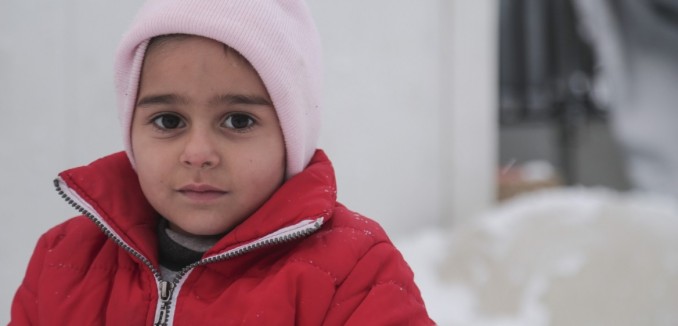Educators and counselors from Jewish Israeli youth movement Hashomer Hatzair and the Arab Israeli youth movement Ajyal soon will embark on a joint voluntary mission to set up a community center and school for Syrian refugee children on the Greek island of Lesbos.
The first delegation of two from each movement, plus coordinator Yair Leibel from Hashomer Hatzair, expects to leave Israel on February 19 and stay for three weeks. The second delegation will be accompanied by Rnin Kahil, the Ajyal coordinator.
Members and leaders of the two youth movements have been meeting periodically for almost a decade, usually for informal dialogues.
“The problem is that after we sit and talk, we go our separate ways,” Leibel told ISRAEL21c. “In one of our last meetings the Syrian situation arose … and there was the thought to do something together to help people who are suffering in a nation in our area, even though Syria is considered an enemy country to Israel.”
Kahil told ISRAEL21c that the goal is to establish a community center that will function as a school in the mornings where the volunteers from Israel will teach math, Arabic, English, and general subjects, and as a center for informal activities in the afternoons.
Though the numbers change as refugees move off Lesbos in search of more permanent accommodations, the island shelters about 5,000 mostly Syrian refugees at any given time, and as many as half of them are 18 or younger.
“The kids have nothing to do,” said Kahil, 21. “They really need someone to lift them up.”
“We are two educational movements and we know how to work with youth,” added Leibel, 28.
Individual Israelis donated ₪200,000 (about $53,000) through a crowdfunding campaign to cover all the costs of the mission for three and a half months. Leibel hopes to raise another ₪50,000 to extend it to five months or even more. “The Israeli public really wants this project to succeed,” Leibel said.
The suffering in Syria over the past few years of civil war, and especially in the last year, has resulted in an outpouring of grassroots and governmental Israeli goodwill.
Youth groups and private citizens have collected money and supplies to be sent through Israeli nonprofit organizations, sometimes at great risk. The Israeli military has organized the transfer of some 2,500 wounded Syrians for treatment in Israeli hospitals since February 2013. The government plans to accept up to 100 Syrian orphans as well as more casualties from Aleppo.
A group of Jewish and Arab restaurateurs recently donated all proceeds from sales of Syrian-inspired dishes over a two-week period to the Karam Foundation for assisting refugees.
Several NGOs, including IsraAID and Natan International Humanitarian Aid, have volunteers in Greece, Serbia and other parts of Europe to tend the physical and emotional wounds of the thousands of refugees fleeing Syria. Natan is about to open a mobile dental clinic for refugees in Lesbos based on its assessment of an urgent unmet need.
Natan’s field coordinator in Lesbos, Einav Levy, and his staff will oversee the Hashomer Hatzair and Ajyal volunteers, providing orientation, support and guidance for the community center project.
“We work with a Swiss organization there that will help us find a place for the center,” said Naama Shilo, COO of Natan. “Each delegation will have two and two and later three and three from each youth movement, and they’ll join our assessment and evaluation station in Lesbos.”
Leibel said a secondary goal of the humanitarian mission is to foster a deeper sense of fellowship among the participants from the two youth movements through working and staying together in Lesbos.
Kahil, who lives in Ramla — a city with a mixed population of Israeli Jews, Arabs, and Christians — said she is excited about that possibility. “We hope the connection they make will continue for later on and leads to building other programs and projects together.”
(via Israel21c)
[Photo: Nicolas Economou/Shutterstock]





